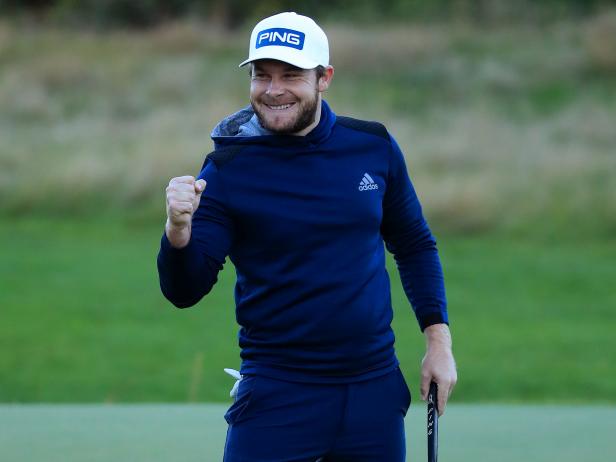Amidst the U.K.-based network’s extensive coverage of the professional game, there lurks on Sky Sports something called the “Golf Vodcast.” In the recent year-ending episode, the host, Josh Antmann, part-time commentator and ex-tour pro Jamie Spence and former Ryder Cup player David Howell combined to light-heartedly dish out various “awards” for 2020. The last of those was named the “Tyrrell Hatton” and given to the player deemed to have indulged in the biggest or most memorable on-course meltdown.
In a contest that was apparently not closely run, Tyrrell Hatton won the Tyrrell Hatton Award, as he has done every year it has been in existence. Which is hardly surprising. Amid the plentiful great shots and rounds the 29-year-old Englishman has played over the course of his professional career, there have been more than a few eye-rolling, head-shaking and, it must be said, amusing moments of high drama. Many times, Hatton’s reaction to a bad shot or bad break has overshadowed his undoubted talent. Many times, his post-shot behavior has fed modern media’s yearning for visual “soundbites.” And for that he has only himself to blame.
To be fair though, the gap between first and second in this imaginary category surely closed more than a bit over the course of the last 12 months. While the perennial “champion” remains one of the favorites to come out on top—his stylish post-shot club throw at the CJ Cup is one of 2020’s more humorous moments on any tour—the temper tantrums have definitely waned, both in frequency and intensity.
This gradual transformation is at least partly attributable to the obvious improvement in Hatton’s performance levels during the season just ended. The hothead has—mostly—been playing with a hot hand, to the point that he will end 2020 at a career-high 10th in the World Ranking. At the same time last year he was 32nd. Starting from that already fairly elevated position, a rise of 22 places represents an impressive leap forward. In any “most improved” poll, he is well-deserving of at least an honorable mention.
Hatton wasn’t doing badly before 2020 dawned. A member of the winning European side at the 2018 Ryder Cup matches in France, he had, by the end of 2019, accumulated four wins on the European Tour. The last of those, the Turkish Airlines Open in which he emerged victorious from what began as a six-man playoff, came just days before Hatton underwent surgery on the aching left wrist that had long been an issue.
“The biggest thing for me this year was being pain-free again,” Hatton says when asked about his progress in 2020. “That’s been nice, to be able to practice for as long as I want and not shy away from hitting balls. I’ve also been in the gym and gotten fitter. That’s also been part of how the year has gone. If you are physically feeling better, you ‘hold’ yourself in a better place. That has helped me play well.”
Especially remarkable was how quickly Hatton performed at the highest level upon his return in late February. Even the three-month lockdown for COVID-19 that soon followed left him seemingly unaffected. In his two tournaments before the break and his two after, Hatton was T-6 at the WGC Mexico, a maiden winner on the PGA Tour at the Arnold Palmer Invitational, T-3 at the RBC Heritage and T-4 at the Rocket Mortgage Classic.
“That Tyrrell played so well almost immediately wasn’t surprising to me,” says Jeff Hatton, Tyrrell’s father and the only swing coach he’s ever had. “We don’t try to change anything in his method. So he can rely on his swing. Although he is still young, his swing is quite old. If you are constantly changing things, you are also second-guessing. And you end up with a bit of the old and a bit of the new. We don’t go that way. Our sole aim is to keep his swing where it was and where it has always been.”
That consistency of message has not gone unnoticed by those in the know when it comes to swing technique.
“Tyrrell’s dad deserves praise for keeping things simple and working on sound fundamentals,” says instructor Denis Pugh, who works with 2018 Open champion Francesco Molinari and former Ryder Cup player Ross Fisher. “That is impressive, especially as it is not always easy for a father to teach a son. I’ve seen them on the course together, and it is good to see that dad is not dad out there. He’s very much the coach.”
Only one thing stood out on the negative side of the Hatton ledger in 2020. Make that three. In the midst of the most successful season of his life, the man from High Wycombe north of London missed the cut in all three majors. For him, that’s a feat not without precedent. In 2017, Hatton left town on Friday evening at all four majors, a year he ended ranked 16th in the world.
“That’s the thing about golf—there are no guarantees,” Hatton says. “I was still trying 100 percent at those majors. But it wasn’t working out. It was really frustrating. My goal from a very young age was to play in all the big events—not just the first half of them. To get there and not perform was very disappointing. Sadly for me, the majors have fallen in weeks when I just haven’t played well, which is how it is sometimes.”
Still, those blips apart, it is clear that Hatton has made significant progress in the nine months since his return from injury in Mexico. And if, as his father insists, his swing has not changed, we must look elsewhere for evidence.
Step forward tour caddie, Mick Donaghy. A straight-talking, no-nonsense Scot, Donaghy has been on Hatton’s bag since the British Masters at Hillside in May 2019. And his presence, by almost unanimous acclaim, is one of the biggest reasons for the steady improvement in his man’s game.
“Mick knows when to say something and when not to,” Hatton says. “He’s been a great partner for me over the last 18 months or so.”
“Mick is the best caddie Tyrrell is ever going to have,” Pugh agrees. “For certain players, he is the ultimate caddie. But for others he would last a week. Tyrrell falls into the former camp.”
“Mick has definitely helped Tyrrell,” adds Hatton senior. “They are a good combination. And they get on well on and off the course. Mick’s strength of character is great for Tyrrell.”
“Mick has been a huge addition to Tyrrell’s team,” says former Ryder Cup captain Paul McGinley. “He is the antithesis of everything Tyrrell is. He is completely nonchalant and laidback. He’s great under pressure. He’s full of common sense. And he doesn’t get caught up in Tyrrell’s antics. In the heat of the moment, Mick stays cool. He dampens Tyrrell’s flame, and so doesn’t let him get in the way of his own performance, which is why that performance has improved this year.”
McGinley’s take on this edition of the ever-complicated player-caddie relationship is acknowledged by Donaghy, who has worked with the likes of Jesper Parnevik, Per-Ulrik Johansson, Ian Poulter, Paul Casey, Jamie Donaldson and Soren Kjeldsen during his long career. His plain-speaking and down-to-earth approach—he displays an amusing lack of respect for just about everyone, no matter their reputation or status—means everyone always knows where they stand. Which is what Hatton needed and wanted. “Tyrrell doesn’t carry a yardage book, so you have to tell him everything,” says Donaghy with his trademark smirk. “It’s just as well; he’s a very good listener.”
Off the course, Donaghy has also played a role, calling himself a combination of “father figure and big brother.” In order to keep the “not that street-wise” Hatton off the Xbox that is his constant companion, the pair have even been known to go shopping together.
“Tyrrell has actually had a pretty boring life,” Donaghy says (cue another smirk). “When I tell him some of the things I’ve done, I have to pick him up off the ground. He loves all the stories.”
Still, it is on the course that the pair have clearly worked best.
“The biggest thing I think I’ve helped with is Tyrrell’s reaction to a bad break or a bad hole,” Donaghy says. “A few times early on in our working together I had to give him some grief. Two holes after, say, a bad bounce or even just a bogey, he’d still be going on about it. I can remember telling him everyone gets bad bounces and everyone drops shots, so just get on with it. ‘Who hit the ball here?’ was another of my favorite questions. ‘You did. So stop moaning about the lie. I don’t want to hear it.’
“At one event, he told me he hated the grasses on the course. I laughed. And asked him if he thought Tiger [Woods] ever turned up at an event and thought he couldn’t win because he didn’t like the grass. ‘Deal with it,’ I told him. ‘If you want to be the best on the planet you have to play well on every type of grass.’”
There remains, however, at least one mountain left to climb. Amid all the progress, those missed cuts at the majors (11 so far, versus five top 10s) remain a nagging issue. At the Masters in November, Hatton was, by Donaghy’s assessment, a victim of more than a few bad breaks. At the PGA in August, he simply played poorly. But the U.S. Open at Winged Foot in September illustrated how Hatton is not quite the finished article.
“He was two under par after two holes at the U.S. Open,” Donaghy recalls. “But he hated the golf course. And that highlighted what is still a bit of a problem. He lacked the patience you need on a U.S. Open course.”
Indeed, as has long been apparent to all, what goes on inside his head is the key variable within the complicated equation that is Tyrrell Hatton.
“Tyrrell hits the ball very straight,” McGinley says. “He has enough power, and on top of that is a brilliant short game. So where is the weakness? There isn’t one. The last ingredient he needs is the confidence to get to the next level. Confidence is not something you are born with. You have to earn it. And you do that through the validation that comes with good results. I have no doubt there are more of those to come for Tyrrell. He is already a top-10 player, so I’ll be really surprised if he doesn’t win a major.”
It’s the obvious next step, Hatton’s formula for continuing success clear: Stay calm. Deep breaths. Love every course. Keep listening to the caddie. Then watch as someone else wins the Tyrrell Hatton Award for 2021.

